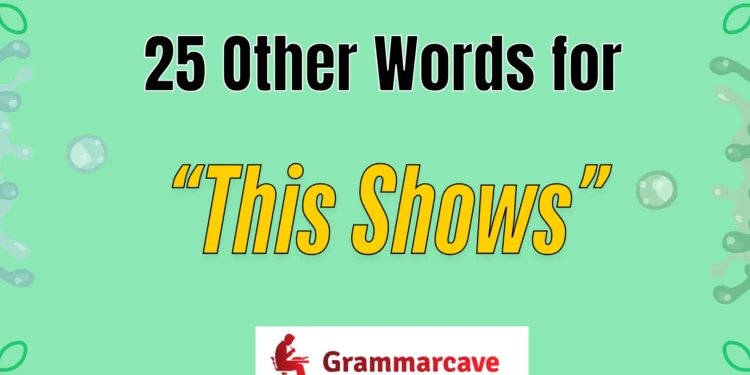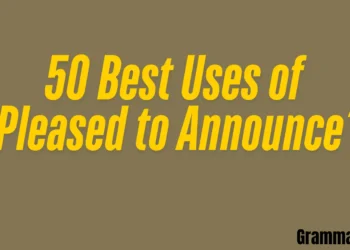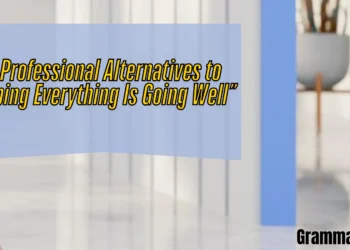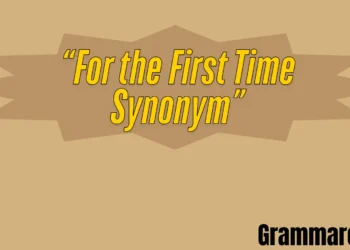Does your writing use some extra zing? Maybe you overdo the “ this shows “ and come across as dull and uninspired. If this is the case, then in this guide, we’ll show you 25 powerful words and phrases to get your ideas across more persuasively and visually.
By the end, you’ll have a toolkit of refined phrases to improve your arguments and provide a more polished/persuasive tone for your writing.
1. Demonstrates
When you say” demonstrates “evidence, you mean how something works or what it is in a specific situation. It’s more about how something behaves than what it does. More commonly, it’s used to prove or support an idea by something that can be seen or evidenced.
When you say something “demonstrates” a claim, you usually imply that tangible evidence supports that claim, such as a test result, case study, or other example that can be observed. This is particularly useful in academic/scientific/analytical writing, where you want to establish validity by using concrete examples.
Using this phrase helps the reader understand not just the “ what “ but also the “ how ” and “ why ” of your argument, making it easier for them to follow your logic and, therefore, rely on your conclusion.
2. Highlights
When you say a fact or observation “emphasizes “ a point, you are underscoring or highlighting a detail for obvious reasons. The phrase is commonly used to convey meaning, so it works well in persuasive or analytical writing where you are trying to get the reader to pay attention to something.
Highlights are like spotlights in your story—they bring certain points to the front of your narrative, helping shape what your audience will interpret and encouraging them to look closer at what you are saying.
It’s either a discussion of a business model’s strengths or the mood of some piece of literature, so you don’t lose what you think your readers are missing.
3. Reveals
To say something “reveals” is to uncover or clarify something previously hidden / unknown/unacknowledged. It adds an element of discovery to your writing by implying your point sheds light on bigger meanings / more profound truths.
It’s beneficial when you want to set the tone and feel of depth or insight in your argument because it implies that your analysis found something that makes sense and reflects how you view the topic.
You can use this word to improve your tone, and it suggests a more important level of critical thinking behind it.
4. Indicates
To use “ indicates ”, you’re suggesting there’s some logical or evidence-based connection between your subject and your argument. It implies that the data or observation leads to a conclusion without making any egregiously emotional or subjective statement.
This is useful in some contexts ( specifically research-based and statistical writing ) and for more formal reports. It gives you a professional and academic tone and makes you write more authoritatively and balancely.
By saying something “indicates “a trend or outcome, you leave yourself open to interpretation yet still let people know your reasoning.
5. Reflects
‘To say something “reflects” a particular quality or idea means it mirrors or represents that concept, usually via an indirect route but mutually related. It’s traditionally associated with values/behavior or identity.
“ Reflects “suits essays covering topics, cultural practices, or human behavior. It allows you to determine how events or actions represent larger social/emotional truths.
So, using that word in your article encourages your reader to look beyond your argument’s literal and, more generally, relevant aspects.
6. Underscores
I assume you mean underscores, which emphasize an idea and require the reader to pay attention. It’s like underlining your point literally and metaphorically.
This word is an excellent tool for making a particular argument or value seem more solid. It’ll help you make your evidence not just valid but vital.
Whatever you argue ( moral, political, analytical ), “ underscores “ will raise the ethical/political ante with vigor and conviction.
7. Suggests
When you hint that something “suggests” a conclusion or an idea, you are giving a possible interpretation supported by evidence without at the same time asserting that it is an irrefutable fact. It’s a word that is not too strong in meaning and is, therefore, suitable for subtle or nuanced analysis.
“Suggests” respects the reader’s intelligence by allowing them to conclude without dominance. Personal evidence can especially be beautiful in analytical or literary discussions.
This word maintains a questioning and determining tone in your writing that is harmonious with open discussions and complicated topics.
8. Exemplifies
When you state that something “exemplifies” a point, you show it as a perfect or typical sample being an instance. A word of power and confidence clarifies how a particular case reflects a broader idea or principle.
Exemplification is the best word in most academic and persuasive writing to express the connection between a given theory and real-life examples in a vivid style. It works well to connect a general discussion to concrete examples that can be easily understood by the audience.
This particular word is a tool. Thanks to it, you build a bond from your main argument to the distinct, comprehensible proof, which, in the end, people will find your writing more appealing and convincing.
9. Implies
Telling “implies” means an inference has a logical relationship, even if it is not directly disclosed. It can enable you to suggest without spelling out hidden messages or effects, which encourages your readers to think deeply.
This is most applicable when proving a point through argument or literary analysis, where the writer doesn’t have to describe absolutely everything.
You can have richer writing by suggesting instead of obviously expressing so people have more food for thought and room for reflection.
10. Clarifies
When you say something “ clarifies ” a concept, you remove any confusion and make your argument more concrete. This approach has a helpfulness and transparency feel, which makes it useful for teaching or explaining.
“ Clarifies “ means it’s not just about presenting ideas but making them understandable; it means you care about the reader’s understanding and are willing to guide them through difficult material.
Using that word makes your work more transparent and easier to read, which is more effective/inclusive.
11. Conveys
As used here, conveys is a term that indicates that an idea, feeling, or message is effectively transferred from one party to another. It refers to the act of transmission — whether emotion, meaning, or intention — and is especially useful to describe tone or mood or its relatedness in writing, speech, or visual medium.
By using “conveys “, you admit that language/imagery can affect the reader/ viewer. In other words,” there is a clear communication channel in your argument so that your audience can understand your intended meaning “. This is especially useful for literary/ rhetorical analysis in which subtle differences and emotional motives are essential.
So, when examples or quotes are used to support this term, they’re not just a support but a vehicle to carry important subtext. This can enrich the overall tone and enhance the reader
engagement, as it shows that the material doesn’t just exist—it speaks.
12. Supports the idea that
The phrase” supports the idea that “simply means your evidence/example provides solid support for a central claim or hypothesis. This is the fundamental philosophy of persuasive writing and academic writing, as it helps you logically organize an argument.
By putting this phrase in there, you are making your evidence relevant and fundamental to your argument. So, by saying that what you are saying is linked directly to the core belief or assertion you want your audience to believe in. You want to emphasize critical thinking and keep a chain of logic that is hard to unscrew.
Using this wording lets the reader see how the example fits into the larger idea. It also gives your argument some weight by showing that it’s not based on a purely subjective assumption but on rigorous analysis.
13. Provides evidence that
When you say” provides evidence,” it represents your example as factual or empirical support for what you are arguing. It reinforces your argument by using credibility and substance to attach to it.
It mostly comes from research-based writing, where the author is supposed to get specific proof or data to back their claims. It shows that you are not just speculating but drawing on the foundation of research. This makes the tone more authoritative and trustworthy.
This said readers are likely to engage with and believe arguments backed by evidence. For you, this implies to your readers that your writings are based on reality, which makes your conclusions more persuasive and unlikely to be challenged.
14. Points to
Not that the “points to “part is necessarily wrong, but it indicates that something is directed at any particular conclusion or inference/pattern you are trying to draw out without being overly aggressive or overt in its presentation.
This term is often used in a thesis if there’s a strong (non-absolute) connection between evidence and conclusion. It allows the writer to suggest some action but keeps the reader’s autonomy intact. This allows the argument you want to make to feel more respectful and intellectually honest.
Using “points to “allows your readers to come along on the journey and find what’s essential. It’s a collaborative way of building argumentation that usually leads to more engaged reading and a better overall experience.
15. Emphasizes
To say something “emphasizes” a point means focusing on it consciously. It’s basically like marking something with a crayon to make it so that important details or concepts come to mind by the reader.
“Emphasis” is a valuable technique in persuasive/descriptive writing, as it determines how your audience will interpret the information hierarchy in your argument. When used correctly, it increases the importance of an idea in your argument and prevents it from being dropped out.
This word also helps maintain your identity as a writer. It will help readers know where you stand and where your argument is most important. With good examples, “emphasizes” becomes a strategic choice that helps ensure clarity and conviction.
16. Makes clear
The term “ makes clear “ means that your statement or example eliminates ambiguity and provides clear and concise information on a topic. It is a term of clarification and valuable openness for teaching or analysis.
Using this expression shows that your goal is to present ideas and ensure they’re fully understood. It positions you as a guide, helping your audience navigate complex material with ease and confidence.
When you use examples that “make clear” your point, you help the reader understand your argument. This is a service-based reading style that builds trust and is more inclusive.
17. Establishes
“Establishes” means to cement ( put down ) the idea or concept for it to be accepted/recognized in any way. It means a foundational, “permanent” word with permanence and authority.
This word is especially useful in academic or formal writing ( where you are building a framework of understanding ). It means that your idea isn’t just valid — it’s now part of the structure ( on which other arguments could be based ) you chose.
By saying “establishes, “you’re also signaling control and authority over your subject. It shows that you’re sure of your position and also helps you persuade the audience that your point will stick.
18. Brings to light
What you mean when you say something “brings to light” is that it reveals or exposes something you might previously have missed or underappreciated. This makes for a less formal writing style.
This term works particularly well for critical analysis, investigative writing, or social commentary because it asserts that your conclusions reveal additional aspects of the topic that readers may not be aware of.
By “bringing something” to light, you’re signaling that you’re an intelligent and attentive reader. It makes your work more interesting and, in turn, often gives your argument an interesting new angle.
19. Marks
“Marks” can indicate that a radical change, start, or defining moment is observed in an argument or storytelling. It conveys a sense of importance and becomes a landmark in writing.
This word is handy in historical, analytical, or reflective writing, where progress and change are the focus. It works as a reference point for the reader in time or thought that reveals something new or significant.
Using “marks” can enable you to concentrate on the core transitions of your ideas, making it easier for the public to comprehend you. Your writing becomes a systematic journey where each main point is part of a larger and more significant progression.
20. Signals
The verb “signals” means something “shows” a new idea or development that will probably occur. This word gives the reader a direction of the development of the work or an evaluation of the situation that is the subject of the work.
“Signals” are very informative when referring to implications or trends that are about to happen in the future but have not been confirmed. They are most often used in imaginary or forecasting writing, which depends on existing patterns or behaviors of the event.
Using this term makes it easier for readers to predict subsequent events or inform them about your argument’s broader implications. It is language conducive to action, prompting new ways of thinking in the readers.
21. This reinforces…
By using the phrase “this reinforces”, you indicate that a piece of information bolsters or makes something stronger, either by strengthening an idea, argument, or bandwagon effect proof in general supportNegativeButton #3 It presupposes that a previously agreed-upon/emphatic point is now confirmed/strengthened by further information, cementing the original assertion in the more incontrovertible ground.
It is also essential in persuasive writing and discussions. It tells you that your arguments are not to be left alone. Those arguments must be carried out and brought together with the support of evidence in a newly emerging way. This can be a powerful strategy for academic writing or formal reasoning, in which multiple sources of support are often more potent than isolated claims. As a result, using words like “this reinforces…” helps you maintain that context—how one piece of evidence builds upon another to create an even stronger foundation for your argument.
For instance, if you are discussing the importance of early childhood education and mention a more recent study that shows increased literacy rates in children who attended preschool, then: “This only adds to support for beliefs about how much foundational experiences in learning during infancy have rippling impacts on academic performance well into adulthood. “This not only supplements the information; it empowers every message completely.
22. This affirms…
When you write or say, “This affirms,” you are pointing out that whatever example, evidence, etc., was cited confirms the maintenance of a point made earlier (like this qualifier also elucidates your true claim). This a term of not only aid but hope — an assurance that the proposal is certainly valid or backed by another trusted source or example.
This affirmation can lend authority and be reliable in persuading or academic discourses. It offers assurance to the reader, and it shows that your arguments are not just possible; they have details. The word “affirms” makes it sound like speaking is more than just conjecture or theory — its actionable concepts are by something that has already been known to be true.
For example, suppose you were reporting higher employee productivity due to the introduction of flexible working hours. In that case, it may read: “This strengthens the evidence for the positive influence work-life balance can have on performance”. He does lend your statement the credibility and authority of a professional.
23. This justifies…
The term “this justifies…” is often used to demonstrate that an action, notion, or finding is simply satisfactory based on the testimony delivered. This indicates that there is a reason behind what would otherwise be disputed and ensures the reader cannot doubt it.
Justification is a strong rhetorical tool for this argumentative writing or analysis style.
It transitions your claims from simple assertions into well-defended positions. Saying “this justifies…” implies that the argument might seem weak, unsupported, or ethically ambiguous without this explanation or evidence. So, the idea behind this phrase is to ensure your reasoning is sound and logical.
For example, suppose you’re discussing when a company will suffer massive financial losses. In that case, you can say, “This is the justification for the difficult decision to minimize staff to achieve long-term sustainability. “This makes it sound more ethical and strategic and explains it more in layman’s terms than an emotive topic.
24. This validates…
This validates... meaning that the information presented contains confirmation/approval, mainly in a way that gives the experience, belief, or statement someone describes as credible or worthy. It’s a powerful word used analytically in academic discourse and within individuals to signify that something has been proven true or worth acknowledging.
Validation is more than just agreement—it carries emotional and intellectual weight. It suggests that an idea or feeling, once uncertain or questioned, has now been backed by evidence or expert support. In a research setting, it gives findings legitimacy; in personal communication, it can affirm identity or personal truth.
For example, if you wrote an article about remote work and included studies showing increased employee satisfaction, you could say, “This proves the rising demand for flexible work and that work in these types of structures fosters well-being.” So, you’re adding authority to something that everyone agrees on.
25. This brings attention to…
When you use the word “this brings attention to “, you will point out something significant ( sometimes something you’d otherwise miss ). It’s a signal for the reader/listener to take a moment and think about a specific detail or theme because it’s essential in the larger context.
It’s beneficial in writing that aims to raise awareness, point out subtle aspects, or introduce less-known details. It can be both observational and analytical to point out that what’s being said warrants scrutiny or reflection. Using this phrase, you intentionally spotlight something that needs further investigation and invite deeper analysis.
For example, in a discussion about gender representation in media, you could say, “This points out the unabashed sexism around leading roles for decades.” This does not just say what’s true; it raises the issue to the level of importance and encourages someone to see the bigger picture.
FAQs:
1. Why should I avoid repeating “This shows” in essays?
Example sentences of the same phrase may make your text seem stilted or simplistic. Varying your language will make your text more fresh and interesting, improve your writing flow, and show more ability with words—especially in academic or professional settings.
2. Are these alternatives amenable for both academic and non-academic writing?
Yes. A lot of them can be used for an academic essay (e.g., demonstrate, indicate, demonstrate, exemplify), but others are more relaxed for casual writing (e.g., point to, bring to light), so it comes down to the tone and formality of the piece you’re writing.
3. Can using synonyms improve my grades in essays?
Yes. Teachers and professors will usually check for a variety of language and accuracy. Overusing vague words or phrases will show you have more advanced writing abilities. It can also help you get better grades.
4. How can I practice using these alternatives naturally?
This is one way to rework sample essay paragraphs and replace “ this shows “ with varying alternatives. Reading academic papers and how the authors present evidence is another great way to learn usage in context.
Conclusion
You can use alternatives to “this shows” to make your writing feel more concise, detailed, and higher quality. Words such as “this illustrates” or “this demonstrates” enhance the evidence behind your arguments and allow you to convey ideas more accurately and with depth.
Each expression has its specific tone and meaning, so you can convey any tone you want with whatever sentence or phrase you choose. Using different words in your work will make it more interesting, understandable, and enjoyable for your readers.








